- Home
- Simon Beckett
Written in Bone dh-2 Page 2
Written in Bone dh-2 Read online
Page 2
The teenager blushed and looked down. ‘Aye.’
‘Aye, some things never change. Now you’re eighteen, you’ll have to put in for a pay rise.’
I saw a spark of interest kindle in her eyes as she looked over the police Range Rover.
‘So what’s going on? Something happened I should know about?’
The bearded man jerked his head dismissively towards us. ‘Try asking them. They won’t tell us anything about it.’
The young woman’s grin faltered when she saw Fraser. Then she recovered, quickly mustering a smile that now held something like defiance.
‘Hello, Sergeant Fraser. This is a surprise. What takes you out to Runa?’
‘Police business,’ Fraser said, flatly, and turned away. Whoever the young woman was, he wasn’t pleased to see her.
The ferry captain and his son busied themselves now the late arrival was on board. There was a motorised whine as the ramp was winched up, and the wooden structure of the boat vibrated as the anchor chain was ratcheted into place. With a last, curious glance in my direction, the young woman went into the wheelhouse.
Then, with a belch of diesel, the ferry cast off and chugged out of the harbour.
The sea was rough, and what should have been a two-hour crossing took almost three. Once we’d left the protection of Stornoway harbour, the Atlantic lived up to its reputation. It was a turbulent grey plain of angry waves, into which the ferry smacked head on. Each time it would rear up over the crests, then slide sickeningly down the far side before beginning the process again.
The only shelter was in the cramped passenger cabin, where diesel fumes and burning hot radiators made an uncomfortable combination. Fraser and Duncan sat for the most part in miserable silence. I’d tried to draw out Fraser about the body, but he obviously knew little more than I did.
‘Just a meat job,’ he grunted, sweat beading his forehead. ‘Some drunk fell asleep too close to his campfire, most likely.’
‘Wallace told me a retired DI had found it. Who is he?’
‘That’s Andrew Brody,’ Duncan piped up. ‘My dad used to work with him on the mainland, before we moved to Stornoway. Said he was a damn good police officer.’
‘Aye, “was”,’ Fraser said. ‘I was asking about him before we came out. Too much of a loner for his own good, apparently. Didn’t like being a team player. I heard he lost it completely after his wife and daughter ran off; that’s why he retired.’
Duncan looked embarrassed. ‘It was stress, my dad said.’
Fraser waved away the distinction. ‘Same thing. Just so long as he remembers he’s not a DI any more.’ He stiffened as the boat suddenly shuddered and yawed over another mountainous swell.
‘Christ, of all the bloody places to get sent to…’
I stayed in the cabin for a while, wondering what I was doing on a small ferry in the Atlantic instead of on my way home to Jenny. We’d been arguing more and more lately, and always over the same thing-my work. This wasn’t going to help, and with nothing to occupy me I found myself fretting over whether I’d made the right decision, and how I could make it up to her.
Eventually, I left the policemen and went on deck. The wind blustered against me, peppering my face with rain, but it was a relief after the sour, overheated cabin. I stood in the bow, welcoming the spray on my face. The island was visible now, a dark mass rising from the sea as the ferry chugged towards it. Staring at it, I felt the familiar tightening in my gut, part nerves, part anticipation of what was waiting there.
Whatever it was, I hoped it was worth it.
A flash of red caught the corner of my eye, and I turned to see the young woman unsteadily making her way across the deck towards me. A sudden dip sent her running the last few steps, and I put out my arm to steady her.
‘Thanks.’
She gave me a gamine smile as she joined me at the rail. ‘It’s a rough one. Iain says it’s going to be fun trying to dock in this.’
Her accent was a softer, more lilting version of Fraser’s. ‘Iain?’
‘Iain Kinross, the skipper. He’s an old neighbour, from Runa.’
‘Is that where you live?’
‘Not any more. My family moved to Stornoway, except for my gran. We take it in turns to visit her. So you’re here with the police, then?’
She asked the question with an innocence I didn’t entirely trust. ‘More or less.’
‘But you’re not one yourself? A policeman, I mean?’
I shook my head.
She grinned. ‘Thought not. Iain said he heard them call you Doctor. Is there someone injured out here, or what?’
‘Not as far as I know.’
I could see that only piqued her curiosity even more.
‘So what’s a doctor doing coming out to Runa with the police?’
‘You’d better ask Sergeant Fraser.’
She grimaced. ‘Aye, that’ll happen.’
‘You know each other?’
‘Sort of.’ She didn’t enlarge.
‘So what do you do on Stornoway?’ I asked.
‘Oh…I’m a writer. I’m working on a novel. I’m Maggie Cassidy, by the way.’
‘David Hunter.’
She seemed to file the information away. We were silent for a while, watching the island gradually take form in the fading light: grey cliffs rising from the sea, topped with featureless green. A tall sea stack, a natural tower of black rock, thrust up from the waves in front of its cliffs.
‘Nearly there,’ Maggie said. ‘The harbour’s just behind Stac Ross, that big rock thingy. Supposed to be the third highest in Scotland. Typical Runa. Its only claim to fame is being third best.’
She stood up from the railing.
‘Well, nice meeting you, David. Perhaps see you again before you go.’
She made her way back across the deck to rejoin Kinross and his son in the wheelhouse. I noticed that she seemed much steadier on her feet than she had when she’d come out.
I turned my attention back to the island we were approaching. Beyond Stac Ross, the cliffs fell back into a small harbour. The light was already starting to fade, but I could see a scattering of houses spreading out around it, a small outpost of habitation in the ocean’s wilderness.
A sharp whistle came from behind me, carrying even above the wind and the sound of the engine. I turned to see Kinross gesturing angrily.
‘Get inside!’
I didn’t need to be told twice. The sea was becoming more violent as the waves were funnelled in between the tall cliffs that bracketed the harbour. Now there was no up and down roll, only a nauseating corkscrew motion as the swells jostled each other, sending sheets of spray across the deck.
Grabbing at handholds to steady myself, I made my way back to the overheated cabin. I waited with Duncan and a pale-faced Fraser as the ferry manoeuvred into the harbour, juddering against the impact of the waves. Through the cabin’s window I could see them smashing against the concrete jetty, throwing up white clouds of spume. It took three attempts to dock, the entire boat vibrating as the engine revved to hold us in place.
We left the cabin, walking with difficulty on the swaying deck. There was no cover from the wind, but the cold air was wonderfully fresh, with a clean saline tang. Gulls wheeled and cried overhead, while on the jetty men were scurrying about, securing ropes and rubber fenders. Despite the cliffs, the harbour was fully open to the sea, with only a single breakwater jutting out to blunt the force of the waves. A few fishing boats were anchored here, jerking against their moorings like dogs straining at the leash.
Low houses and cottages clung barnacle-like to the steep hillside that dropped down to the harbour. The landscape that spread out behind them was a treeless green vista, windswept and bleak. In the distance, the skyline was dominated by a brooding peak, its tip lost in the mist of low clouds.
The young woman who’d introduced herself as Maggie Cassidy hurried off the ferry as soon as the ramp was lowered. I was a little surprised sh
e didn’t say goodbye, but didn’t give it much thought. Behind me the Range Rover’s engine started up, and I turned to climb into the back. I noticed that Fraser let the young PC drive. The boat was still see-sawing on the swells, and he eased it carefully down the undulating ramp.
A craggy-faced man was waiting for us on the jetty. He was mid-fifties, tall and powerfully built, with the indefinable look of a policeman. I didn’t need to be told that this was the retired detective inspector who had found the body.
Fraser wound down the window. ‘Andrew Brody?’
The man gave a short nod. The wind ruffled his grey hair as he looked at the three of us inside the car. Behind him, the locals who had helped moor the boat watched curiously.
‘This all of you?’ he asked, his disapproval obvious.
Fraser gave a stiff nod. ‘Aye, for now.’
‘What about SOC? When are they coming out?’
‘We don’t know they are yet,’ Fraser retorted. ‘That decision’s not been taken.’
Brody’s mouth tightened at his tone. Retired or not, the ex-DI didn’t like being talked down to by a mere police sergeant.
‘Then what about CID? They’ll have to attend, regardless.’
‘A DC’s going to follow on from Stornoway after Dr Hunter here has taken a look at the body. He’s a forensic expert.’
Until that moment Brody hadn’t paid me any attention. Now he looked at me with more interest. His eyes were sharp and intelligent, and I felt in that brief moment I’d been assessed and judged.
‘There’s not much light left,’ he said, glancing at the darkening sky. ‘It’s only fifteen minutes’ drive, but it’ll be dark by the time we get out there. Perhaps you’d like to ride with me, Dr Hunter. I can brief you on the way.’
Fraser bridled. ‘I’m sure he’s seen burned bodies before.’
Brody regarded him for a moment, as though reminding himself he no longer held rank. Then he turned his steady gaze back to me.
‘Not like this.’
His car was parked on the quayside, a newish-looking Volvo saloon. The inside was spotless. It smelled of air freshener and, more faintly, of cigarettes. An old border collie was on a blanket in the back, black muzzle greyed with age. It stood up excitedly when Brody got into the car.
‘Down, Bess,’ he said, mildly. The dog immediately settled. Brody frowned as he examined the dashboard controls for the heater. ‘Sorry, not had it long. Still trying to work out where everything is.’
The headlights of the Range Rover told us Fraser and Duncan were following as we drove out of the harbour. The days didn’t last long this far north at this time of year, and dusk was already giving way to darkness. The street lights were on, illuminating a narrow main road barely deserving of the name. It ran up from the seafront through the village: a handful of small shops surrounded by a mix of old stone cottages and newer bungalows that had a temporary, prefabricated look.
Even from the little I could see of it, it was apparent that Runa wasn’t the backwater I’d expected. The ruins of a small, roofless church stood by the roadside. But most of the doors and windows in the houses we passed looked new, as though they’d recently been replaced. There was a small but modern school, and a little further out the timber structure of the community hall boasted a new extension that bore a sign saying Runa Medical Clinic.
Even the road itself had been resurfaced. It was only narrow, not much more than a single lane with semicircular passing places every hundred metres or so, but the smooth black tarmac would have put most mainland roads to shame. It climbed steeply through the village, then levelled out as we passed the last few houses. On a hilltop overlooking them, silhouetted against the darkening sky, was a tall and crooked standing stone, rising from the grass like an accusing finger.
‘That’s Bodach Runa,’ said Brody, seeing where I was looking. ‘The Old Man of Runa. Legend is he went out there to watch for the return of his son, who’d gone to sea. But the son never came back, and the old man stood there so long he turned to stone.’
‘In this weather I can believe it.’
He smiled, but it quickly died. After wanting me to ride with him, he now seemed uncomfortable, as though he was unsure where to start. I took out my mobile to check for messages.
‘You’ll not get a signal out here,’ Brody warned. ‘If you want to call out you’ll have to use either a landline or a police radio. And if we get a good blow even they don’t always work.’
I put my phone away. I’d half hoped Jenny might have left a message, though I didn’t really expect it. I’d call her from a landline later and try to smooth things between us.
‘So what sort of “forensic expert” are you?’ Brody asked.
‘I’m a forensic anthropologist.’
I glanced at him to see if I needed to explain. Even police officers sometimes had trouble with what I did. But Brody seemed satisfied.
‘Good. At least we’ll have one person out here who knows what he’s doing. How much did Wallace tell you?’
‘Just that it was a fire death, and that there was something odd about it. He wouldn’t say what, except that it wasn’t suspicious.’
His jaw set in disapproval. ‘Did he now?’
‘Why, are you saying there is?’
‘I’m not saying anything,’ Brody said. ‘You can make your own mind up when you see it. I just expected that Wallace would have sent a full team over, that’s all.’
I was starting to have a bad feeling about this. There were strict protocols to be followed if a death was suspicious, and normally I wouldn’t get involved until a Scene of Crime team had processed the site. I hoped Wallace hadn’t let his preoccupation with the train crash cloud his judgement.
But I also remembered what he’d said about Brody. Used to be a good man. Retired police officers often found it hard being out of the loop. Brody wouldn’t be the first to exaggerate in order to feel in the thick of things again. I didn’t put much credence in Fraser’s gossip about his crack-up, but I wondered if similar doubts hadn’t coloured Wallace’s decision.
‘All he wants me to do is take a look,’ I said. ‘If I see anything that suggests it might not be accidental, then I’ll back off until SOC gets out here.’
‘That’ll have to do, I suppose,’ Brody said grudgingly.
But he still wasn’t happy. Whatever he’d told Wallace, the superintendent clearly hadn’t accepted it at face value, and for a one-time detective inspector that was bound to rankle.
‘How did you find the body?’ I asked.
‘The dog caught the scent when I was taking her out for a walk this morning. It’s in an abandoned crofter’s cottage-a croft’s a small farm,’ he added, for my benefit. ‘You sometimes get kids going out there, but not usually in winter. And before you ask, no, I didn’t touch anything. I might be retired, but I know better than that.’
I didn’t doubt it. ‘Any idea who it might be?’
‘Not a clue. Far as I know no one from the island’s been reported missing. And there’s less than two hundred people live out here, so it’d be hard for anyone to disappear without its being noticed.’
‘Do you get many visitors from the mainland or other islands?’
‘Not many, but some. The odd naturalist or archaeologist. All the islands are peppered with ruins: stone age, bronze age and God knows what. There are supposed to be burial cairns and an old watchtower on the mountain. And there’s been quite a lot of renovation work going on, so we’ve had builders and contractors coming out. Road resurfacing, houses being done up, that sort of thing. But not since the weather turned.’
‘Who else knows about the body?’
‘No one as far as I’m aware. The only person I told was Wallace.’
That explained the curious looks of the locals when the police had arrived. Their presence would be big news on an island as small as this. I doubted the reason we were here would remain a secret for long, but at least for the moment we didn’t have to wor
ry about sightseers.
‘He said it was badly burned.’
Brody gave a grim smile. ‘Oh, it’s badly burned all right. But I think you’d better see for yourself.’
He said it with both confidence and finality, closing the subject.
‘Wallace told me you used to work with him.’
‘I did a stint at HQ in Inverness. You know it?’
‘I’ve only travelled through. Runa must have been quite a change after that.’
‘Aye, but for the better. It’s a good place to live. Quiet. There’s time and space to think.’
‘Are you from here originally?’
‘God, no. I’m an “incomer”,’ he said. ‘Wanted to get away from it all when I took early retirement. And it doesn’t get much further away than this.’
There was no disputing that. Once we had left the harbour village, there was hardly any sign of life. The only habitation we’d passed was an imposing old house, set well back from the road. Other than that there had been only the occasional ruined bothy, and sheep. In the gathering twilight, Runa looked beautiful, but desolate.
It would be a lonely place to die.
There was a jolt as Brody turned off the road and bumped down an overgrown track. Ahead of us, the car’s headlights picked out a crumbling old cottage. Wallace had said the body had been found at a croft, but there was little left to show this must once have been a working farm. Brody pulled up outside and turned off the engine.
‘Stay, Bess,’ he ordered the border collie.
We climbed out of the car as the Range Rover drew up behind us on the track. The cottage was a squat, single-storey building that was slowly being reclaimed by nature. Looming up behind it was the peak I’d seen earlier, now only a black shape in the encroaching darkness.
‘That’s Beinn Tuiridh,’ Brody told me. ‘It’s what passes for a mountain out here. They say if you climb to the top on a clear day you can see all the way to Scotland.’
‘Can you?’
‘Never met anyone stupid enough to find out.’
He took a Maglite from his glove compartment, and we waited outside the car for Fraser and Duncan to join us. I collected my own torch from the flight case in the Range Rover, then we made our way towards the cottage, torch beams bouncing and criss-crossing in the darkness. It was little more than a stone shack, its walls furred with moss and lichen. The doorway was so low I had to stoop to go inside.

 Where There's Smoke
Where There's Smoke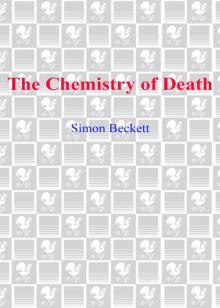 The Chemistry of Death
The Chemistry of Death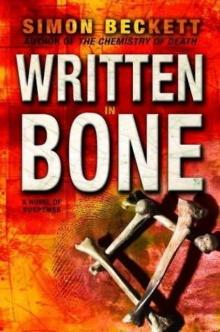 Written in Bone
Written in Bone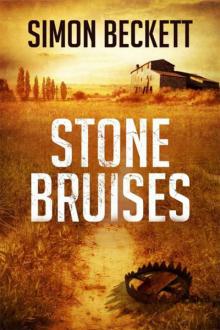 Stone Bruises
Stone Bruises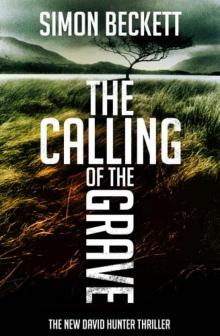 The Calling of the Grave
The Calling of the Grave Whispers of the Dead
Whispers of the Dead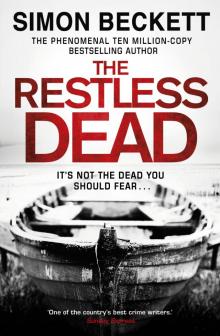 The Restless Dead
The Restless Dead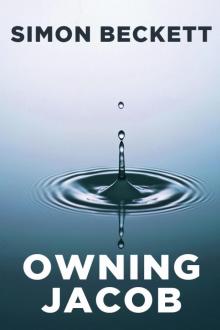 Owning Jacob
Owning Jacob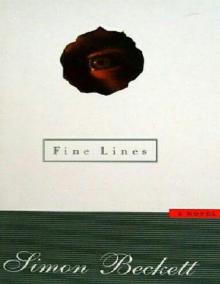 Fine Lines
Fine Lines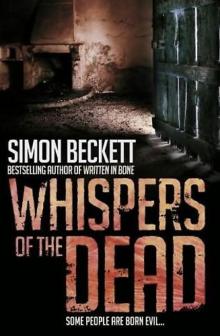 Whispers of the Dead dh-3
Whispers of the Dead dh-3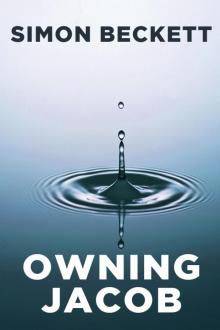 Owning Jacob (1998)
Owning Jacob (1998)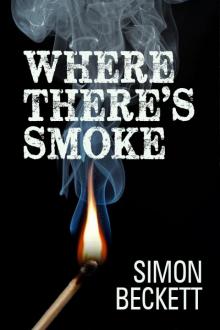 Where There's Smoke (1997)
Where There's Smoke (1997)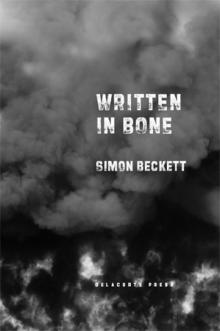 Written in Bone dh-2
Written in Bone dh-2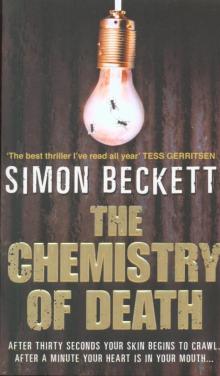 The Chemistry of Death dh-1
The Chemistry of Death dh-1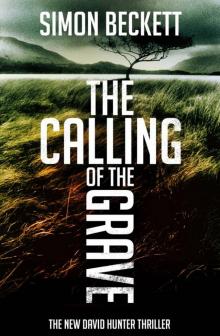 The Calling Of The Grave dh-4
The Calling Of The Grave dh-4